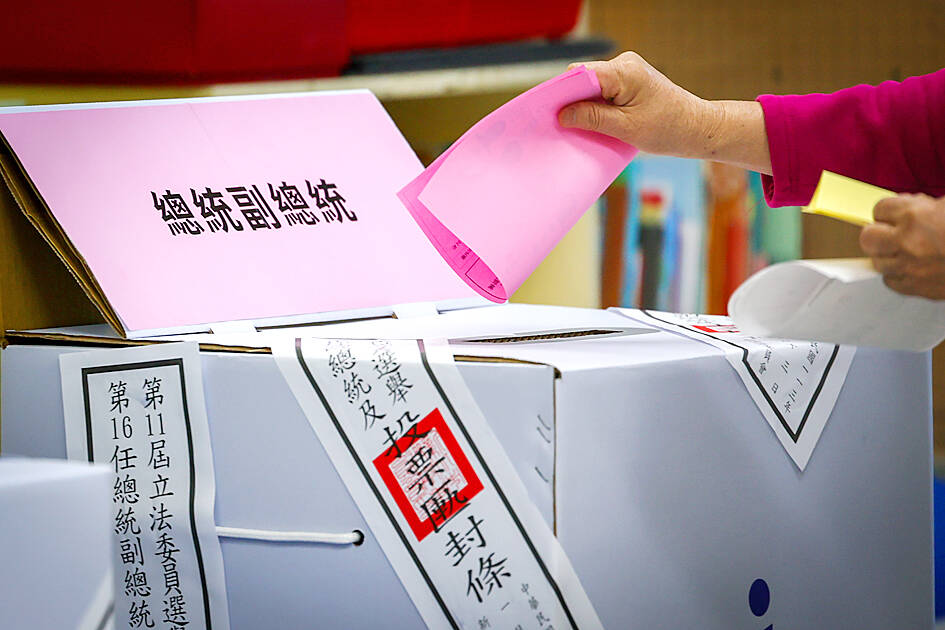Chinese Nationalist Party (KMT) lawmakers are pushing to change the presidential election model to a two-round voting system.
KMT Legislator Lo Chih-chiang (羅智強) is gathering signatures for a petition to amend the Constitution to require a two-round voting system, while KMT Legislator Weng Hsiao-ling (翁曉玲) is proposing an amendment to Article 63 of the Presidential and Vice Presidential Election and Recall Act (總統副總統選舉罷免法), which currently states that the pair of candidates that receives the most votes are elected as president and vice president.
Under Weng’s proposal, the presidential and vice presidential pairing that receives more than half of the votes must also receive more than 20 percent of the votes from all eligible voters to win an election. If the candidates fail to meet that threshold in the first round, a second round, including the two sets of candidates with the most votes, would be held 14 days later, with the pair that receives the most votes winning.

Photo: CNA
In the current system, the candidates with the most votes win the election, but the votes they receive do not necessarily exceed more than half of the ballots from eligible voters, Weng said.
When the winning presidential and vice presidential candidates receive fewer than 50 percent of the votes from eligible voters and fewer than the sum of the other sets of candidates combined, they lack general public support, she said.
When the party they represent also fails to achieve a majority in the legislature and does not need to form a coalition government, a situation arises in which the few rule over the many, creating a possible constitutional crisis, she added.
Introducing a two-round voting system would not only determine which party has the support of most voters, but would also give smaller parties a chance to become part of the government, and make it necessary for parties to negotiate and work with each other, Weng said.
Many countries with direct presidential elections use a two-round voting system, she said.
Some even have exhaustive voting systems, while only Taiwan, South Korea and a few others use a hybrid system that combines the first-preference plurality system with block voting, she added.
Under such a system, candidates would not have to worry about the opinions of other voters and could concentrate on consolidating support from their voter base, which reduces the legitimacy of the election, Weng said.
If the president is elected under such a system, and refuses to compromise and negotiate with opposition parties, they would have a tough time governing, she said.
Two-round voting would not be required in every election, as a second round would not be necessary if the winning candidates receive votes from more than half of the eligible voters.

Taiwan is to commence mass production of the Tien Kung (天弓, “Sky Bow”) III, IV and V missiles by the second quarter of this year if the legislature approves the government’s NT$1.25 trillion (US$39.78 billion) special defense budget, an official said yesterday. Commenting on condition of anonymity, a defense official with knowledge of the matter said that the advanced systems are expected to provide crucial capabilities against ballistic and cruise missiles for the proposed “T-Dome,” an advanced, multi-layered air defense network. The Tien Kung III is an air defense missile with a maximum interception altitude of 35km. The Tien Kung IV and V

The disruption of 941 flights in and out of Taiwan due to China’s large-scale military exercises was no accident, but rather the result of a “quasi-blockade” used to simulate creating the air and sea routes needed for an amphibious landing, a military expert said. The disruptions occurred on Tuesday and lasted about 10 hours as China conducted live-fire drills in the Taiwan Strait. The Civil Aviation Administration (CAA) said the exercises affected 857 international flights and 84 domestic flights, affecting more than 100,000 travelers. Su Tzu-yun (蘇紫雲), a research fellow at the government-sponsored Institute for National Defense and Security Research, said the air

A strong continental cold air mass is to bring pollutants to Taiwan from tomorrow, the Ministry of Environment said today, as it issued an “orange” air quality alert for most of the country. All of Taiwan except for Hualien and Taitung counties is to be under an “orange” air quality alert tomorrow, indicating air quality that is unhealthy for sensitive groups. In China, areas from Shandong to Shanghai have been enveloped in haze since Saturday, the ministry said in a news release. Yesterday, hourly concentrations of PM2.5 in these areas ranged from 65 to 160 micrograms per cubic meter (mg/m³), and pollutants were

Taiwan’s armed forces have established response protocols for a wide range of sudden contingencies, including the “Wan Chun Plan” to protect the head of state, the Ministry of Defense (MND) said today. After US President Donald Trump on Saturday launched a series of airstrikes in Venezuela and kidnapped Venezuelan President Nicolas Maduro, concerns have been raised as to whether China would launch a similar “decapitation strike” on Taiwan. The armed forces regularly coordinate with relevant agencies and practice drills to ensure preparedness for a wide range of scenarios, Vice Minister of National Defense Hsu Szu-chien (徐斯儉) told reporters before a